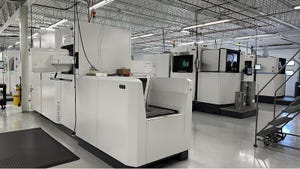December 3, 2009

Las Vegas - "Our goal is to give every design engineer theability to do more simulation," says Autodesk Director Grant Rochelle. "But inorder to do that, we have to make simulation easy to do."
Rochelle, who heads up thenearly formed Mechanical Simulation Group at Autodesk, says that most designengineers have the desire to do more. But while many companies understand thebenefits, he said in an interview with DesignNews at Autodesk University, that theydon't view most simulation tools as within the reach the average CAD user, nordo they view them as scalable.
"Many of these tools areexpensive and used by only a few specialists in a company. Engineers dosimulations on fewer designs," Rochelle said. "And as a result, there's a lotof over-design out there. Engineers can't have failures, so they build in thesehuge safety factors."
How is Autodesk going tomake things easier for design engineers? They are working it from the top downwith a suite of specialized simulation and analysis tools Autodesk has acquiredover the past four years - Solid Dynamics kinematics/dynamics software,Plassotech analysis and simulation software for mechanical design, Moldflow injection molding simulationsoftware and Algormechanical simulation software earlier this year. And they're working it fromthe desktop up, with AutoCAD Inventor Simulation Suite, which allows engineersto perform integrated motion simulation and stress analysis on their desktops.
"We'll keep evolving thesetools to make them simpler to use, yet without sacrificing the robustness ofthe analysis," said Rochelle. He noted, for example, that Autodesk has beenworking on some new guidance tools to help new and occasional users of theInventor Simulation Suite get a jump start. No annoying Clippy-type tool here,though. Rochelle said that the goal was to "put Charlie Bliss in the box." Bliss,who used to work for Applied Materials, is a real person. He's a fervent,expert user of Inventor Simulator and one of the most respected, knowledgeableusers around. Just the kind of guy you really would like to have guiding youthrough a simulation.
Autodesk has tested the newguidance tools with 12 design engineers, none with any previous experience, whowere able to successfully complete a structural frame analysis experiment,thanks in large part to "Charlie."
But while Rochelle says thereis something to a more intuitive UI, one of the most important things engineersneed is real-time feedback, which would allow them to optimize their designsacross multiple attributes like cost and weight. "It isn't efficient to sitback and wait for the simulation results to come back," said Rochelle. "But forreal-time feedback to work, engineers aren't going to be doing the simulationon their computers, too much computing power is required. They will do it inthe cloud."
While Autodesk is prettyearly in the development stages of working out what bits will be done on thedesktop and what bits will be done in the cloud, Rochelle says that in the "verynear term" it will have some experiments ready and will be engaging with usersfor feedback. To start, Autodesk will be focusing on basic materialsoptimization and linear static stress, as suggested by Autodesk customersthemselves. Once designers get comfortable with those things, it plans to moveinto thermal and fluids.
Autodesk is encouragingdesign engineers to experience and give feedback on Autodesk Algor Simulationsoftware that allows users to perform a first pass of design validation andoptimization before manufacturing. Download the free AlgorDesignCheck softwarehere.
Autodesk Labs is alsooffering a PipingDesign Technology Preview, a free software download that allows users todesign, simulate, and optimize piping systems by performing structuralsimulation to determine static and dynamic stresses.
About the Author(s)
You May Also Like





